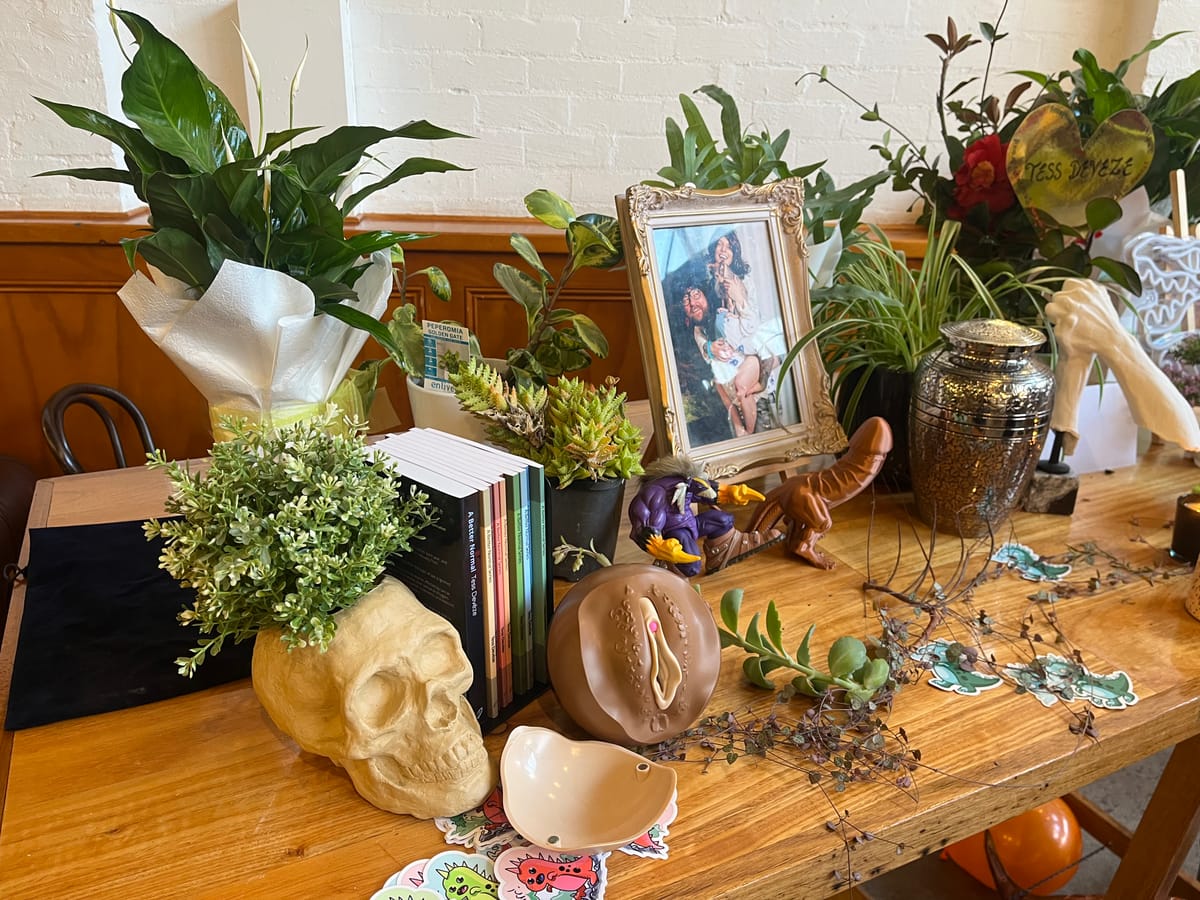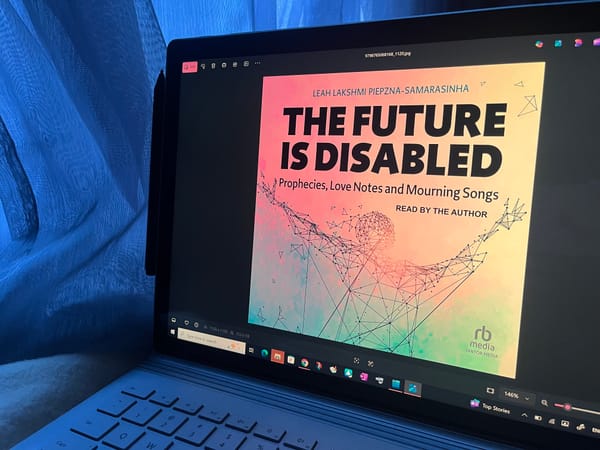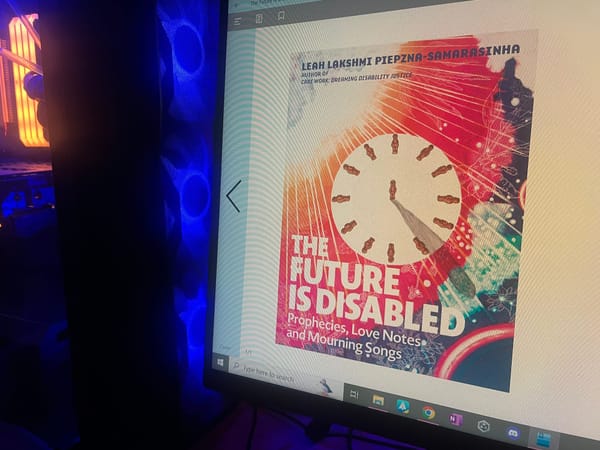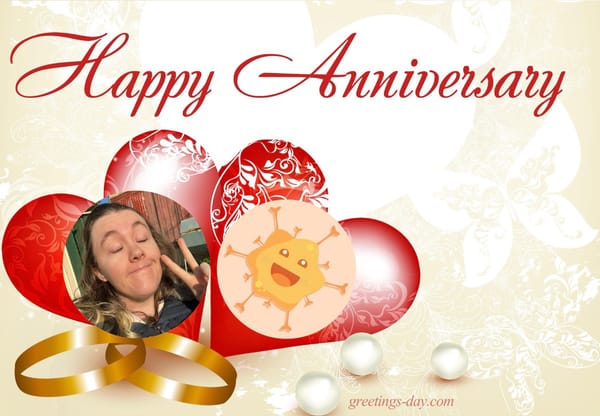5 Kink Things Everyone (yes, everyone) Should Know
Wherein I apply kink and sex teachings to "everyday" life, because a lot of it is real useful!

In my time in kink and sex communities, it's struck me that many of our teachings on consent, negotiation, communication and even the way our bodies work physiologically are wildly useful not just to those having sex or practicing kink, but to everyone.
Inspired by my late friend Tess, who helped teach me a lot of what I know on these topics, I thought I'd share some of my favourite bits of kink-community practices and knowledge that I think everyone should know!
I learned this stuff from a lot of different people and sources (including AO3 😭), but many of those people and sources were tied to the organisation Curious Creatures (which Tess was a part of) back when they were operating.

The following points will use some relatively basic kink examples to explain concepts before jumping off to discuss how said concepts are relevant in a non-kinky context. There won't be any discussion of me or personal things that I've gotten up to in this one though, apart from one footnote which has a CW at the start of it and is easy to skip 😄
Let's get into it!
1: Asking Why in Consent
On the rare occassions society graces us with actually being taught about the concept of consent - whether in the context of sex or in the rest of life - it is taught as a very simple concept: I ask Sally if she wants to come with me to a friend's party. Sally says yes. Therefore, Sally has consented, and we are both excited for the party! Right?
Well, not necessarily.
In kink circles, we are often taught to go one layer deeper into consent than just considering whether or not Sally agreed. We additionally consider why I asked Sally to go to the party, and why Sally said yes.
The following explainer (and the Sally scenario) is taken directly from The Art of Consent website, edited slightly by me to add context. If you find this concept useful, I highly suggest taking a look at their more detailed explainer of this concept - what they have dubbed The Wheel of Consent.
Let's consider the Sally scenario again, but this time ask ourselves the question "who is this invitation designed to benefit". Here are three scenarios:
- I really want to go to the party, but I know my ex will be there which I feel anxious about, and I’m hoping Sally is willing to come along with me for moral support (I ask Sally to come for my benefit).
- I'm not that bothered about the party, but I know that someone Sally is really keen to meet will be there, and so I suggest we go together (I'm offering to go for Sally's benefit).
- It’s a party that I think we’ll both enjoy, and it’ll be even more fun for both of us if we go together (I'm offerring for both of our benefits).
Now consider a fourth scenario:
- I'm not bothered about the party but I'm assuming Sally really wants to go and would like my company. Sally's not bothered about the party either, and is assuming I really want to go and want her company.
In this scenario I offer my invitation for Sally's benefit. Sally accepts it for my benefit. We both consent to going to the party, but neither of us actually wants to be there beyond supporting the other and we could have had a much better time hanging out on our own!!
Here is what the Art of Consent website says on the matter:
"The last example can happen all too easily in life - and is surprisingly common during sex. Having mutually consented to sex, people engage in a particular sexual activity which each assumes the other is really into, but neither person really is. In other words, it's not for either of them! In the party example, Sally’s response to my question will almost certainly depend on her assumptions about which of the above scenarios she thinks is happening. In both everyday life and during sex, clarifying 'who is it for' helps avoid misunderstandings and brings more clarity, authenticity and enjoyment to all our interactions with others."
I cannot express how often I now notice this miscommunication happen in my daily life ever since I learned this concept.
I ask if I can help my friend with the dishwasher, they'd like the help but say no because they know I’m chronically ill and assume I was just offering as a curtesy - meanwhile I'm actually having an energetic day and was making a genuine offer.
I ask my sister if I should turn the air con on even though it's already cool in my room because I know it gets hotter in her room than mine - she says yes even though her room is a fine temperature because she assumes I want to turn it on for my own benefit. Now we're both shivering in our rooms on a 40C day!!
The most amusing example to me - which does fall under the banner of physical intimacy consent rather than "applicable to everyone" but I want to give it anyway, sue me - is that for the first few months of our relationship, one of my partners and I would make out for the other's benefit even though neither of us actually liked kissing that much...!!! We eventually worked it out and had a good laugh about it, but - Wild !!!
2: Safewords & Traffic Lights
Content warning for this section: light discussion of consensual non-consent role play
I'm sure you're familiar with the concept of a safeword, right? 50 Shades of Grey style, Edward Cullen Christian Grey is gonna to tie you up and have his way with you unless you say 'pineapple'.
A safeword is a code word you agree on before doing BDSM so that if you want to say a fun cheeky "omg noooo, nooooooo don't tie me uppppppp, teeheehee" it's very clear that you are just pretending to not want to be tied up, because if you actually didn't want to you'd say the code word instead.
In many kink circles, the common safeword system used is the traffic light system, which actually has three code words rather than one. These words are green, orange[5] and red.
Red is pretty self explanatory - it's your traditional "stop" safeword. You say red and whatever it is that you're doing stops immediately, you drop out of any role play roles and check in with each other as yourselves.
You can also use red to explain to someone that you have specific hard limits on what you'd like to be doing. Maybe you really like being tickled most places, but you've had a recent foot injury that means its not safe for you to be tickled there. If someone is tickling you and they approach your feet, you can say "red on tickling my feet!" and they now know that feet tickling is a serious no-no for you.
Then you've got green, which means "yes, this is good, keep going, all is well, yum, this rocks" etc. Green is useful as a very clear signal that you are enjoying what is happening - even if you might not appear to be.
A lover of tickling might be squealing and wriggling away as someone is tickling them - normally an indication that the other person should definitely should stop! But if you say "green!" in the middle of your squealing, the other person knows you're enjoying it and you're all good to continue.
It's also just nice to have a shorthand way to tell someone you're enjoying something, without having to work out what the 'right' words to express that are.
Finally, there's orange. The exact definition of orange changes a bit based on the circumstances, but in general if you say "orange" it means you are approaching or have just hit a specific limit. You don't want to stop the overall interaction you're having with the other person, but there's a specific part of it that's a bit much.
"Orange" often is accompanied by a little description about what part of the experience is getting too intense. Maybe you're being tickled and realise you're getting a bit overstimulated at your neck but the rest of your body is fine - you can say "orange on my neck!" and the other person knows to move away from that area for now.
Having a set of code words that are universally understood to be "we only use these terms when we are being serious" can be soooooooooo useful outside of a BDSM/sex/tickling context too.
Have you ever been in a situation where you and your friends are engaging in some teasing banter, but someone accidentally jokes about something that you find hurtful? In that joking context, it can be hard to say "hey, that was actually hurtful" or "can we stop this please?", and sometimes softer approaches like "haha, okay gang lets wrap it up" are taken as a continuation of the joke rather than a serious attempt to end the exchange.
A simple "red" or "orange" can instantly make it clear that you're being serious, so you can all acknowledge what happened and move on. Miscommunications become a lot harder! Everyone should have code words !!![6]
3: Thank People for Saying "No"
Saying "no" is hard for all number of reasons. Lots of us have been raised to think that we can't say "no" to other people's requests, or that saying "no" means someone won't want to spend time with us anymore, or that our value only comes from what we can give to others - to just name a few of the reasons that "no" can be hard!
Saying "no" can also be hard if the reasons behind the "no" are complex, or you know that what you're saying "no" to is something the other person really wants or needs - such as if someone asks you for help that you aren't in a position to give safely or at all.
Saying "no" is incredibly important though. It's a major way we can assert our personal boundaries and take care of ourselves. Additionally - but often overlooked - knowing that someone you're in relationship with is able to say "no" to you means that you can feel more comfortable asking for things. You don't need to spend as much energy second-guessing whether or not the "yes" you're getting is genuine, or being given out of as sense of obligation/similar.[7]
One thing that you can do to help reduce the challenge of saying "no" is to genuinely thank people when they do. It's a really simple act, but is a lovely way to affirm that person's boundary, your desire that they be truthful with you about their limits and capacity, and that you care about your relationship to them.
A genuine "thank you" may also help reassure someone if they've learned through trauma that saying "no" = the other person crashing out.
4: Don't Yuck My Yum
Both an expression and a rule, "don't yuck my yum" refers to not acting grossed out or disgusted about something that someone else likes simply because you don't like it.
Let's say someone tells you they like vanilla ice cream (or sex), and you personally detest vanilla ice cream (or sex). To respond to this person talking about how they like vanilla ice cream by saying: "ew, I really don't like vanilla ice cream" would be "yucking their yum".
Even if you add a qualifier to the sentence - "ew, I really don't like vanilla ice cream - but I'm glad you like it and support you!", the exchange still leaves a sour taste in the mouth of the person who lives vanilla ice cream. Was it necessary to insert your disgust of vanilla ice cream into the conversation when the other person was talking about how much they like it? Probably not.
This isn't to say that you need to pretend you like vanilla ice cream, but adding the yuck aspect ("ew", "oh i find that so gross", "why would you like vanilla ice cream, its awful??") isn't cool.
There's nuance here too, of course. Maybe someone has a particular history with or is triggered in certain ways by vanilla ice cream that means they don't like to see people eating it in front of them, or be told about someone else's experience eating it. If that's the case, a simple "hey, i have a complex history with vanilla ice cream, would you mind if we not talk about it when we're together, or if i leave the room when the topic comes up?" will serve everyone a lot better that throwing direct or indirect shade.[4]
This mantra is of particular importance in sex and kink spaces, where people are actively learning to work through social taboos and hang ups they may have. If you've finally plucked up the courage to admit that you really like having your toes licked and someone else is like "ew!!! why would you like that?!!" - that's a really awful experience.
This applies in non-sexy contexts too. Someone I knew used to get really grossed out when I would take baths while on my period, and it made me really upset when they would act disgusted around me because of it. I wish we could have just had a direct conversation about it - clearly they felt uncomfortable thinking about someone having a bath on their period, but rather than saying "hey, I'm glad you had a lovely bath, but could you not mention the period aspect around me please?", they projected their disgust outward onto me.
5: Drop
“In the context of BDSM, drop refers to the emotional and psychological feelings that may occur after an intense experience, particularly following a power exchange or heightened state of arousal.” (paraphrased slightly from here)
Let me give you an example of drop in a BDSM context:
- Lila is engaging in a kink or sex activity - let’s say they’re being spanked.
- Lila enjoys herself thoroughly throughout the activity.
- Once the activity is over, Lila suddenly starts crying - seemingly for no reason.
This sudden emotional change - dropping from excitement, bliss, enjoyment, etc to feelings of sadness, distress, overwhelm or fatigue - is referred to in kink spaces as “drop”.
If you’ve heard of “drop” before, you’re most likely to have heard it referred to as “sub-drop”, because it is often people who take on a submissive role in BDSM who experience drop the most. But drop can occur to anyone in a BDSM scene - and, additionally, is actually a human physiological response that effects us all in different ways at different points in our life!
To explain why this is a useful concept to understand, I’ll first explain why drop happens.
Drop is the result of chemical changes in our bodies. When you are engaging in activities that make you feel good, your body produces a lot of “happy” chemicals, like dopamine (the "feel-good" chemical) and - if your activity involves other people or physical touch - oxytocin (the "bonding" or "cuddle" chemical) [9].
However, during an intense activity, your body produces far more of these happy chemicals than it does normally throughout your day. And if your body suddenly stops producing those chemicals, the experience of suddenly “dropping” back to your body’s normal chemical levels - or potentially a state with even less happy chemicals than usual - can be jarring and confusing.
There are two main ways this happens.
The first way is when the activity that is causing your body to produce the happy chemicals stops. As Lila is no longer being spanked, her body stops producing oxytocin and dopamine at a high rate. The levels of these chemicals fall, and Lila’s body becomes exhausted from doing the hard work of pumping out so much more good chemical juices than usual. The sudden contrast between feeling amazing and suddenly feeling kinda average and tired can be shocking and distressing - leading Lila to be confused and start crying. [1]
The second way is: the intense oxytocin/dopamine-inducing experience goes on for long enough that your body literally runs out of the fuel to make these chemicals. Suddenly, even if nothing has changed about the experience - boom. No more happy chemicals. Lila is suddenly feeling exhausted and upset for reasons she can’t explain in the middle of her scene. [10]
Whilst sex and physical touch are great activities for putting your body into the good-chemical-inducing overcharge, these chemical changes can happen in your body outside of these circumstances too.
The most obvious example I can give you of times when drop occurs outside of sex is the “crash” that many performers feel after performing a show. Musicians, actors and the like will often report feeling like they’re “on a high” onstage, and having a magically wonderful time - only to feel extra sad, upset or lethargic the next day or at the end of the show's season. That’s drop! It’s the same chemical reaction!
A similar thing occurs in sports - “runner’s high” being an example of the high-dopamine-etc chemical state that sports and exercise can induce, followed by a potential drop in mood and energy levels later on.
Multi-day activities can also cause drop after them. When I was a teen I would go to a two week intensive choir camp every summer. We would be having the time of our lives when we were there, but after we all went back home many of us would enter a period of being exhausted and sad. This form of drop even had a specific term in our choir - “Post-Gondie Depression” (Gondie being short for our choir name, Gondwana).
Going on holiday or travelling, locking in for multiple hours or days on a project you’re passionate about, or spending a lot of continuous time around people you love and get excited by - these can all be activities that make our brain pump out those good chemicals, and are all activities that we might experience drop after.[8]
Apart from being generally interesting (to me at least!), I think it’s super useful for us to know how our bodies work in this way. Knowing what’s going on physiologically when we feel bad can assure us that there’s nothing externally “wrong” that’s caused this reaction, that this feeling is normal, explainable, and will pass.
If you know in advance that an activity might cause drop, you can pencil in time for self care or soothing activities afterwards, or plan to engage in other activities that get you feeling good and supported such as connecting with friends, doing some light exercise or arts and crafts (in the sex and kink world, this is what we call “aftercare”).
You can also reduce the likelihood of experiencing drop by easing out of an activity slowly rather than abruptly stopping. This allows dopamine levels of fall slowly, giving our body more time to acclimatise to lower levels rather than experiencing the shock of the sudden chemical drop - it's part of why a "cool down" is encouraged when you do sports.
Yay for self-knowledge about how we work as humans !!
So there you go! I hope you have enjoyed reading about some of the cool stuff I have learned from kink and sexuality spaces over the past few years. Let me know if there's anything here that resonated with you, or that you think might be useful to incorporate into your life!
See you next time :)
- This is also why people can feel distressed, upset, disgusted or exhausted after orgasm - an experience some call "post-nut clarity" (which can also refer to feelings of productive clear-headedness/similar, but whilst that is related to similar chemical changes, its beyond the scope of this piece lol). At orgasm, the body produces a huge amount of dopamine all at once!! It makes sense that people might feel worse when those chemicals drop away.
- All hail Contrapoints Twilight
- If the other person still won't stop bringing up vanilla ice cream, then you have a problem! but in the efforts of not having this post exceed 4000 words I won't get into that sdfkjsdkjf
- or 'yellow' - amusingly the commom term changes based on geography. almost everyone i know in naarm says orange, but i grew up reading fanfic and erotica mainly stemming from north "america" where 'yellow' is the norm, so this was rather a shock to me!
- just you wait until i get talking about MICROSCRIPTS someday !! (or you can learn about them yourself here)
- If the challenges of asking for things/not knowing whether or not its appropriate to say 'no' to something is of interest, I recommend you check out the theory of Ask vs Guess Culture
- Incidentally, this is also why so many people experience crashes after their ADHD meds wear off. ADHD meds increase the amount of dopamine in your brain, just like these other activities. When the meds wear off, the dopamine levels drop, producing the same “drop” effect.
- (these are both big simplifications, as is this whole "drop" explainer, but it's useful nonetheless so go with me here haha)
-
CONTENT WARNING ME TALKING ABOUT SEX I'VE HAD:
This happened to me the second ever time I had sex, at, like, 3am !!!!! I suddenly felt incredibly disregulated and could not stand to be touched.
When I explained how I was feeling, one of the people (teehee) I was with asked me if I knew what drop was. I did (everyone say thank you AO3!), thankfully, but was struck by the thought of how horrible it would be to be going through this if I had no idea what was happening, or if there was no one around me to explain!





